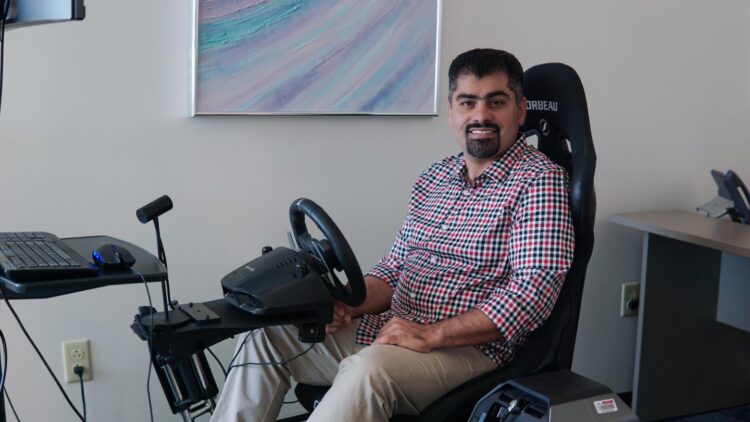FAU College of Engineering and Computer Science receives US utility patent for ‘adaptive mood control in semi or fully autonomous vehicles’
Americans have one of the highest levels of fear in the world when it comes to technology related to robotic systems and self-driving cars. Addressing these concerns is paramount if the technology hopes to move forward.
A researcher from Florida Atlantic University’s College of Engineering and Computer Science has developed new technology for autonomous systems that is responsive to human emotions based on machine-learned human moods. His solution, “Adaptive Mood Control in Semi or Fully Autonomous Vehicles,” has earned a very competitive utility patent from the United States Patent and Trademark Office for FAU.
Adaptive Mood Control provides a convenient, pleasant, and more importantly, trustworthy experience for humans who interact with autonomous vehicles. The technology can be used in a wide range of autonomous systems, including self-driving cars, autonomous military vehicles, autonomous airplanes or helicopters, and even social robots.
“The uniqueness of this invention is that the operational modes and parameters related to perceived emotion are exchanged with adjacent vehicles for achieving objectives of the adaptive mood control module in the semi or fully autonomous vehicle in a cooperative driving context,” said Mehrdad Nojoumian, Ph.D., inventor, and an associate professor in the Department of Computer and Electrical Engineering and Computer Science and director of the Privacy, Security and Trust in Autonomy Lab. “Human-AI/autonomy interaction is at the center of attention by academia and industries. More specifically, trust between humans and AI/autonomous technologies plays a critical role in this domain, because it will directly affect the social acceptability of these modern technologies.”
The patent, titled “Adaptive Mood Control in Semi or Fully Autonomous Vehicles,” uses non-intrusive sensory solutions in semi or fully autonomous vehicles to perceive the mood of the drivers and passengers. Information is collected based on facial expressions, sensors within the handles/seats and thermal cameras among other monitoring devices. Additionally, the adaptive mood control system contains real-time machine-learning mechanisms that can continue to learn the driver’s and passengers’ moods over time. The results are then sent to the autonomous vehicle’s software system allowing the vehicle to respond to perceived emotions by choosing an appropriate mode of operations such as normal, cautious or alert driving mode.
“One of the major issues with the technology of fully or semi-autonomous vehicles is that they may not be able to accurately predict the behavior of other self-driving and human-driving vehicles. This predication is essential to properly navigate autonomous vehicles on roads,” said Stella Batalama, Ph.D., dean, College of Engineering and Computer Science. “Professor Nojoumian’s innovative and cutting-edge technology circumvents this problem by using machine learning algorithms to learn patterns of behaviors of people riding in these vehicles.”
###
About FAU’s College of Engineering and Computer Science:
The FAU College of Engineering and Computer Science is internationally recognized for cutting edge research and education in the areas of computer science and artificial intelligence (AI), computer engineering, electrical engineering, bioengineering, civil, environmental and geomatics engineering, mechanical engineering, and ocean engineering. Research conducted by the faculty and their teams expose students to technology innovations that push the current state-of-the art of the disciplines. The College research efforts are supported by the National Science Foundation (NSF), the National Institutes of Health (NIH), the Department of Defense (DOD), the Department of Transportation (DOT), the Department of Education (DOEd), the State of Florida, and industry. The FAU College of Engineering and Computer Science offers degrees with a modern twist that bear specializations in areas of national priority such as AI, cybersecurity, internet-of-things, transportation and supply chain management, and data science. New degree programs include Masters of Science in AI (first in Florida), Masters of Science in Data Science and Analytics, and the new Professional Masters of Science degree in computer science for working professionals. For more information about the College, please visit eng.fau.edu.
About Florida Atlantic University:
Florida Atlantic University, established in 1961, officially opened its doors in 1964 as the fifth public university in Florida. Today, the University serves more than 30,000 undergraduate and graduate students across six campuses located along the southeast Florida coast. In recent years, the University has doubled its research expenditures and outpaced its peers in student achievement rates. Through the coexistence of access and excellence, FAU embodies an innovative model where traditional achievement gaps vanish. FAU is designated a Hispanic-serving institution, ranked as a top public university by U.S. News & World Report and a High Research Activity institution by the Carnegie Foundation for the Advancement of Teaching. For more information, visit http://www.
Media Contact
Gisele Galoustian
[email protected]





